The Perils of Black Sea Security[Over] 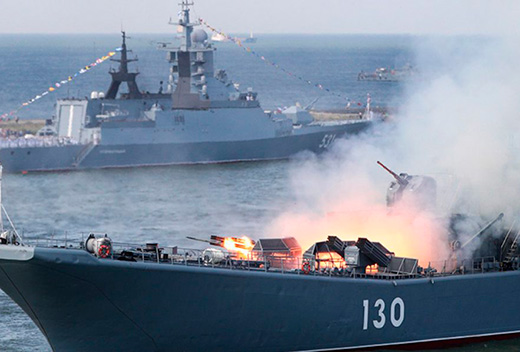 By Eugene KOGAN, Tbilisi-based defence and security expert By Eugene KOGAN, Tbilisi-based defence and security expert
The unprovoked Russian invasion of Ukraine on February 24th, 2022 has substantially changed the security situation around the Black Sea. The three NATO member states Bulgaria, Romania, and Turkey have pursued a very different and distinct policy with regard to Russia. Bulgaria, as will be further presented, remains dependent on Russian gas and oil. Despite the recent Russian decision to halt gas exports to Bulgaria over the country’s refusal to pay for supplies in roubles, Bulgaria did not buckle under pressure. Romania maintains a watchful eye after the Russian military operations along the Black Sea coast, in general, and the city of Odessa, in particular. Turkey maintains balanced relations with Russia and Ukraine. READ MORE.
Peacekeeping in Karabakh Can Learn from the UNOMIG Experience[Over]  By Benyamin POGHOSYAN, PhD, Chairman, Center for Political and Economic Strategic Studies By Benyamin POGHOSYAN, PhD, Chairman, Center for Political and Economic Strategic Studies
As Armenia and Azerbaijan come closer to launching bilateral negotiations over the normalisation of relations, many issues wait for a solution. Currently, the hottest debates are underway regarding the future status of Nagorno Karabakh and the legal modalities of the transit for Armenian and Azerbaijani goods passing each other territories. The war in Ukraine and the complete collapse of Russia – West relations added geopolitical components to the equilibrium. Do we have EU – Russia competition over the mediation process? Are there any disagreements between Brussels and Moscow on promoting lasting peace and stability in the South Caucasus? All these issues are worthy of being discussed and debated. READ MORE
Lack of Results in Armenia-Azerbaijan Talks Can Quickly Lead to Renewed Violence[Over]
 By Fuad SHAHBAZOV, Baku-based independent regional security and defence analyst By Fuad SHAHBAZOV, Baku-based independent regional security and defence analyst
On May 12, the Foreign Ministers of Azerbaijan and Armenia held another meeting in Dushanbe, Tajikistan, on the side-lines of the Russia-led Commonwealth of Independent States Ministerial summit, and with the participation of the Russian foreign minister. Although Armenian Foreign Minister Ararat Mirzoyan characterized the meeting as another “productive interaction” between the warring parties, little progress has been made in the peace negotiations between Baku and Yerevan since the 6 April meeting of the leaders of the two countries in Brussels. READ MORE
Pashinyan and Aliyev Meet in Brussels Again: What Next[Over]  By Benyamin POGHOSYAN, PhD, Chairman, Center for Political and Economic Strategic Studies By Benyamin POGHOSYAN, PhD, Chairman, Center for Political and Economic Strategic Studies
On May 22, 2022, Armenian Prime Minister Pashinyan and Azerbaijani President Aliyev met in Brussels. The meeting was facilitated by the President of the European Council Charles Michel. For many observers, the May 22 trilateral meeting created a feeling of déjà vu. The same leaders were in Brussels less than two months ago. On April 6, 2022, Michel organized another meeting between Armenian and Azerbaijani leaders with the same sequence and results. Michel met separately with two leaders, then they held hours-long trilateral discussions, and late in the night, he published a statement summarizing the results. On April 6, participants discussed the same issues as on May 22 – the restoration of communications, the start of the border delimitation and demarcation process, and the launch of negotiations to sign a bilateral Armenia-Azerbaijan treaty. READ MORE
A Transitional Arrangement for Karabakh May Be Necessary[Over]  By Benyamin POGHOSYAN, PhD, Chairman, Center for Political and Economic Strategic Studies By Benyamin POGHOSYAN, PhD, Chairman, Center for Political and Economic Strategic Studies
The issue of the status of Nagorno Karabakh cannot be avoided in future discussions on an Armenia-Azerbaijan bilateral peace treaty. One solution is to agree to some transitional arrangement.
The April 6 Brussels meeting between Armenian Prime Minister Nikol Pashinyan and Azerbaijani President Ilham Aliyev gave the Armenia – Azerbaijan negotiations new momentum. The sides agreed to establish a border delimitation and demarcation commission and take steps to launch negotiations over the signature of a bilateral peace treaty. These issues were also agreed upon in principle back in November 2021, when two leaders had a meeting in Sochi facilitated by Russian President Vladimir Putin. READ MORE
Black Sea Security in Times of War[Over] 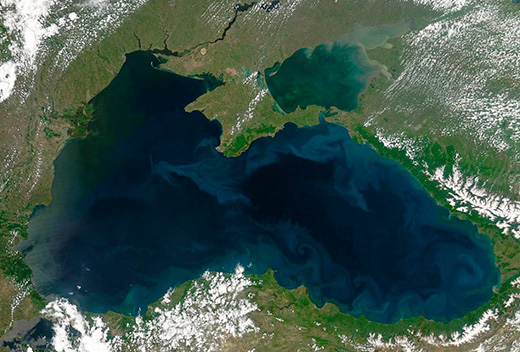 By Eugene KOGAN, Tbilisi-based defence and security expert By Eugene KOGAN, Tbilisi-based defence and security expert
There is no doubt that the ongoing Russian military action against Ukraine profoundly affects the rest of the Black Sea littoral states: Bulgaria, Georgia, Romania and Turkey. The tense standoff of recent weeks placed each of them in a difficult position between apprehension and, particularly with Turkey, a kind of peacemaker or rather mediator, which Russia now ignores completely.
Romanian Defence Minister, Vasile Dincu, said in January 2022 that “Russia, at the moment, is not a direct threat to Romania, but it is [rather] a threat to security in the [Black Sea] area”. The author disagrees with the minister’s statement since the Russian military, which is stationed on the occupied Crimean peninsula - not much more than 100 km from the Danube Delta – is a direct threat to Romania, even though Russian officials will blame the other side for posing a threat to Russia. Furthermore, the region’s three NATO member countries, namely Bulgaria, Romania and Turkey, have until today been unable to create and implement a comprehensive Black Sea security strategy together with NATO aspirants Georgia and Ukraine to counter the challenges posed by Russia. The latter, however, successfully implemented its divide and rule policy in the region. READ MORE.
Iran and the Second Karabakh War: Assessing the New Balance of Power in the South Caucasus[Over]
 By Fuad SHAHBAZOV, Baku-based independent regional security and defence analyst By Fuad SHAHBAZOV, Baku-based independent regional security and defence analyst
The second Karabakh war between Azerbaijan and Armenia in September of 2020 opened a new page in the modern history of the post-Soviet region and explicitly changed the geopolitical landscape in the South Caucasus. With Baku regaining control over large swathes of territories, Turkey has obtained a greater role in the region, acting as a guarantor of the ceasefire regime between Azerbaijan-Armenia alongside Russia, whereas Iran’s diminished position has gotten less attention. Indeed, in the post-war period, Tehran saw a steep decline in its regional influence in the Southern Caucasus, losing its direct land route to Armenia and facing the growing influence of Russia, Israel, and Turkey. Prior to the conflict, Iran had long pursued a balanced foreign policy in the region, developing a partnership with Armenia and Azerbaijan, respectively. However, Turkey’s close relations with Azerbaijan since the 1990s prevented Iran from establishing powerful leverage over this country, unlike landlocked Armenia, which has relied on Iran as one of the main economic partners. READ MORE
Russia-China-Afghanistan[Over] 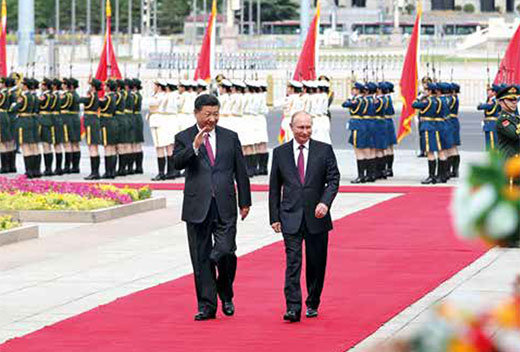 By Eugene KOGAN, Tbilisi-based defence and security expert By Eugene KOGAN, Tbilisi-based defence and security expert
Moscow and Beijing are likely to discover that their initial joy over the US withdrawal from Afghanistan may be premature. Afghanistan under the Taliban remains divided, insecure and uncertain about its current and future path. Without stability and security, neither Beijing nor Moscow will provide economic assistance while the international community will continue to shun Afghanistan.
Russia’s Presidential Envoy to Afghanistan, Zamir Kabulov, noted that “The Taliban were easier to negotiate with than the old “puppet government” of the exiled President Ashraf Ghani.” The latter was seen by, and from Moscow, as a puppet of the West and contacts that Russia maintained with Hamid Karzai’s successor were either downgraded or revised. At the same time, contacts between Russia and the Taliban only increased. With the West’s departure, Moscow is seizing up the opportunity indirectly to recognise the authority of the Taliban, which it officially designated as a terrorist organisation back in 2003 though without burning its bridges with the militant group. READ MORE.
Risks and Opportunities of the Emerging South Caucasus Regional Order[Over]  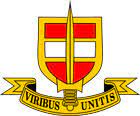 Policy Recommendations from the 21st workshop of RSSC SG/PfP Consortium Policy Recommendations from the 21st workshop of RSSC SG/PfP Consortium
The Regional Stability in the South Caucasus Study Group (RSSC SG) was proud to resume its activities in a face-to face format in Rome, 7-10 September 2021. On that occasion, the Study Group discussed and subsequently agreed on a number of policy recommendations.
The second Karabakh war was the catalyst for massive changes in the South Caucasus. Certainly, the new territorial realities fit better the internationally recognized territories of both countries, but important challenges remain, making it important for the RSSC SG to meet to spur thinking on the way forward. The conflict was also an opportunity for other regional actors. Georgia deployed uncommon diplomacy and peace-making skills in the aftermath of the combat phase between Armenia and Azerbaijan. While Georgia demonstrated its ability at being an effective bridge between the two belligerents, Russia established itself as the essential arbiter and guarantor of a fragile ceasefire, and of purveyor of security for new lines of demarcation between Armenia and Azerbaijan. Turkey has not waited and sided with Azerbaijan in achieving and securing the new territorial realities. READ MORE
Why non-aligned Azerbaijan signed an alliance declaration with Russia[Over]
 By Fuad SHAHBAZOV, Baku-based independent regional security and defence analyst By Fuad SHAHBAZOV, Baku-based independent regional security and defence analyst
On February 22, the President of Azerbaijan Ilham Aliyev made an paid official trip visit to Moscow to discuss and sign a new declaration on allied cooperation with Russia. The visit came just a day after President Putin's infamous decision to recognize the independence of the so-called Donetsk People's Republic and Luhansk Peoples' Republic in Eastern Ukraine. President Vladimir Putin’s “unexpected” decision deteriorated relations with Ukraine, even more and was followed by the new round of economic sanctions imposed by the U.S and the EU.
President Aliyev's visit to Moscow triggered debates in Azerbaijan and Russia, respectively, on whether the main text of the declaration was pre-negotiated between the two leaders, or prepared amid the escalation around Ukraine. READ MORE
War and Peace in the South Caucasus: Putin Style[Over]  By Alan Whitehorn, Professor Emeritus in Political Science, The Royal Military College of Canada By Alan Whitehorn, Professor Emeritus in Political Science, The Royal Military College of Canada
Without a doubt, Russia’s leader Vladimir Putin is the greatest factor in the risk of war between Russia and Ukraine. Yet paradoxically, Putin is perhaps the best hope for peace in the South Caucasus, at least as far as Azerbaijan and Armenia are concerned. The Georgian situation is, however, another matter. But one should take one step at a time in this exceptionally dangerous and conflict-prone region.
The recent 2020 Karabakh War between Azerbaijan and Armenia was, in effect, a continuation of the bitter 1990s ethno-religious territorial war over Nagorno-Karabakh (Artsakh) that emerged between the two newly independent states in the midst of the break-up of the Soviet Union. The 1990s conflict produced thousands of casualties and hundreds of thousands of displaced civilian ethnic minority refugees. It was a humanitarian catastrophe for families on both sides of the border. READ MORE
- February 28, 2022 20:03PM
Assessing the Urban Terrorism Strategy of the Kurdistan Workers' Party in Turkey[Over]
 By Fuad SHAHBAZOV, Baku-based independent regional security and defence analyst By Fuad SHAHBAZOV, Baku-based independent regional security and defence analyst
Since its emergence in the 1980s, the Kurdistan Workers' Party (PKK) has been a significant source of concern to the state of Turkey. With the escalation of conflict between the Turkish state and the ethnic Kurdish community in the 1990s, the level of violence explicitly increased, and the civilian death toll rose to its highest point. Though the PKK could not ensure absolute authority in large, predominantly Kurdish provinces in the southeast, it gradually shifted to a new strategy —urban violence— to undermine the Turkish state's authority in Kurdish regions.
According to theories of violent resistance, violence is the only practical and productive tool of mass mobilisation of ethnic insurgencies against political systems. In the case of Kurdish nationalism in Turkey, many scholars argue that Turkey's policy of ethnic nationalism has had a decisive role in shaping Kurdish ethnic nationalism throughout these years. READ MORE
- February 28, 2022 19:44PM
Will Turkey Gamble with Ukraine against Russia?[Over]  By Yeghia TASHJIAN, Beirut-based regional analyst and researcher, columnist, "The Armenian Weekly” By Yeghia TASHJIAN, Beirut-based regional analyst and researcher, columnist, "The Armenian Weekly”
In the past few years, Turkey has been gradually increasing its influence in Ukraine through trade and military cooperation amid escalating tensions between Moscow and Kyiv, challenging Moscow’s standing in the Black Sea region. The strategic cooperation between Ankara and Kyiv is not limited to political statements, but rather encompasses other important fields, such as the economy, security and defence industries. Moreover, relations between the two countries gained further impetus with Russia’s unification of Crimea in 2014 and reached their peak during the administration of Ukrainian President Volodymyr Zelensky, who assumed office in 2019. READ MORE
Assessing Armenians’ Geopolitical Situation [Over]  By Alan Whitehorn, Professor Emeritus in Political Science, The Royal Military College of Canada By Alan Whitehorn, Professor Emeritus in Political Science, The Royal Military College of Canada
Armenia is at yet another critical time. The war losses were substantial and impacted greatly. Violent Azerbaijani-Armenian border incidents continue, with property damage, military personnel injuries and deaths. The risks ahead are significant. Accordingly, it is crucial to assess the geopolitical situation that confronts Armenia, commencing first with key problems and challenges and then exploring some opportunities.
Amongst the pressing issues is the fact that demographically Armenia has far less manpower than Azerbaijan, even if women were conscripted too. Armenia’s population has been declining significantly due to outmigration and this pattern has been accelerating after the recent Karabakh war and various phases of the Covid pandemic. An army historically based on conscription needs to address its critical declining population base. READ MORE
Military Aerospace Expertise and Exports from Israel[Over] 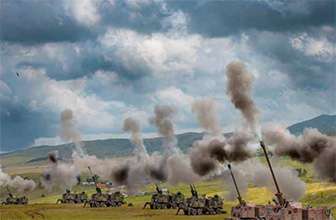 By Eugene Kogan, Tbilisi-based defence and security expert By Eugene Kogan, Tbilisi-based defence and security expert
Local domestic military aerospace expertise has been honed over a period of almost 60 years. Israel’s procurement of US-built fighter aircraft and Israeli technicians and aeronautical engineers developing subsystems and avionics for the jets has enhanced their skills and expertise.
Rafael Advanced Defence Systems’ cooperation with Raytheon has taken military aerospace expertise to the next level. The triple combination of buying from the United States, developing subsystems locally, and teaming up with the US has contributed to successful arms exports from Israel. The Ministry of Defence International Defence Cooperation Authority (known as SIBAT) realised in November 2019 that the international arms market was undergoing serious changes and certain adjustments would be needed in order to remain competitive and increase the market share of Israeli defence companies. READ MORE.
Azerbaijan-Armenia Border Dispute – Could the Conflict Re-escalate?[Over]  By Fuad Shahbazov, Baku-based independent regional security and defence analyst By Fuad Shahbazov, Baku-based independent regional security and defence analyst
Half a year after the Russian-brokered ceasefire agreement was signed between Azerbaijan and Armenia ending the 44-day war in Karabakh, peace in the complex region is not on the horizon. A new stage of discontent and harsh statements came last week after Azerbaijani Armed Forces reportedly crossed the border with Armenia in the Syunik province and advanced around 3 kilometres by Sev Lake. Yerevan dubbed this action as an explicit provocation and an attempt to occupy Armenian territory, whereas Baku denied the accusations, stating that Azerbaijani border guards established a military control point at the heights around the lake without advancing into Armenian territories. READ MORE
- September 14, 2021 19:40PM
Armenia’s Five Stages of Grief[Over]  By Benyamin Poghosyan, PhD, Chairman, Center for Political and Economic Strategic Studies By Benyamin Poghosyan, PhD, Chairman, Center for Political and Economic Strategic Studies
Todd Fabacher, Co-Founder, Distrikt Foundation, Gyumri
Countries, just like people, will experience the five stages of grief after a significant loss. 2020 was a challenging year for all nations. COVID – 19 pandemic and economic downturn have negatively impacted almost everyone. It was an exceptionally difficult year for Armenia because, besides the pandemic, defeat in the war launched by Azerbaijan against the unrecognized Nagorno Karabakh (Artsakh) Republic in autumn 2020 resulted in significant material and human losses. In the first half of 2021, Armenia grasped domestic political instability, triggering an early parliamentary election in June 2021. READ MORE
- September 4, 2021 06:14AM
Israeli-Greek Naval, Air Force and Defence Industry Cooperation[Over]  By Eugene Kogan, Tbilisi-based defence and security expert By Eugene Kogan, Tbilisi-based defence and security expert
The bilateral Israeli-Greek military and defence industry cooperation was not created in a vacuum, but is a by-product of the steadily deteriorating Israeli-Turkish relations which include two important events: the famous World Economic Forum incident in Davos on January 29th, 2009 and the Mavi Marmara incident on May 31st, 2010. The Davos incident was further aggravated by the Mavi Marmara incident, which left ten Turkish citizens dead after clashing with Israeli commandos as the latter boarded the ship which was trying to break the Gaza blockade. Moreover, the military component of Israeli-Turkish relations, which used to be the backbone of the relations, is still missing and is unlikely to reappear in the near future. READ MORE.
The Causes of the Third Karabakh War[Over]  By Alan Whitehorn, Professor Emeritus in Political Science, The Royal Military College of Canada By Alan Whitehorn, Professor Emeritus in Political Science, The Royal Military College of Canada
Just when you think the war is over, it actually is not. Multi-generational families are haunted by the dead. There are too many displaced persons, multitudes of refugee children uprooted from schools and homes, and continued mistreatment of POWs. The major economic dislocations and massive war debts are part of the ongoing and mounting negative tally. The competing legal terms national self-determination vs territorial integrity are brandished about in fervent ideological battles that further entrench the hardened positions of two combatant sides. READ MORE
Polish-Romanian Defence and Security Policy[Over]  By Eugene Kogan, Tbilisi-based defence and security expert By Eugene Kogan, Tbilisi-based defence and security expert
A joint initiative of Romanian President Klaus Iohannis and Polish President Andrzej Duda, known as the ‘Bucharest Nine', was launched in November 2015 and laid a foundation for foreign and security policy meetings and discussions. As the next step, the Warsaw NATO Summit in July 2016 accelerated military-to-military cooperation. As a result, the initiative brought Romanian troops to Poland and Polish troops to Romania on a rotational basis in March 2017. In addition, their pivotal positions in the east and in the south of NATO’s reach have further increased their cooperation in a variety of defence and security programmes. READ MORE.
Russia’s Peace Mission in Karabakh Provokes Reaction in Azerbaijan[Over]  By Fuad Shahbazov, Baku-based independent regional security and defence analyst By Fuad Shahbazov, Baku-based independent regional security and defence analyst
As part of the 10 November ceasefire agreement that ended last year's 44-day war, a contingent of Russian soldiers was deployed to Karabakh as peacekeepers. However, the lack of a formally agreed mandate and perceptions of Russian overstepping has led to growing tensions between Baku and Moscow.
The second Karabakh war ended with the signing of a Russia-brokered ceasefire agreement and the deployment of Russian peacekeeping forces with the aim of preventing further hostilities and ensuring stability in the region. However, the ceasefire arrangements between Azerbaijan–Armenia on one side and Russia–Turkey on the other has left more questions than answers. The fact that there is still no formally agreed mandate for the Russian forces operating on the ground causes outrage in Azerbaijan as local authorities loudly criticise Moscow for provocative actions. READ MORE
The Karabakh War: The Lessons of Defeat in the Cyberspace[Over] 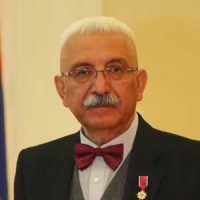 By Lieutenant-General (Ret.) Hayk S. Kotanjian, PhD, Professor Strategic Security Studies By Lieutenant-General (Ret.) Hayk S. Kotanjian, PhD, Professor Strategic Security Studies
Reflecting on the lessons of the military aggression of Turkey and Azerbaijan against the Nagorno-Karabakh Republic and the Republic of Armenia, strategic analysts of the security institutions and processes continue to monitor the dynamics of the peace-war around Karabakh in the context of the world order transformation. Russian President Vladimir Putin at the session of the Russian Security Council of March 26, 2021, emphasizing the exceptional role of cybersecurity, pointed out the strategic priority of the development of the cyberspace resources management system. In general, this coincides with the assessments of the special significance of this security sector, voiced recently by the US President Joe Biden and Chinese President Xi Jinping. READ MORE
Peace and Reform: Europe’s Role in the Post-Karabakh War Caucasus[Over]  By Anna Ohanyan, PhD, non-resident senior scholar in the Russia and Eurasia Program of Carnegie By Anna Ohanyan, PhD, non-resident senior scholar in the Russia and Eurasia Program of Carnegie
Europe has a role to play in rebuilding the South Caucasus and promoting a sustainable future. One important dividend would be democracy promotion in the region. A Russian-enforced peace could be remarkably conducive to that end.
Since the Soviet collapse, Europe and Russia have remained unable to construct a common framework for security cooperation. The Kremlin has consistently pushed for grand security bargains to assert its privileged spheres of influence over swathes of the Eurasian landmass. In contrast, Europe’s normative preferences for a market economy and liberal democracy have favoured a very different approach, one based on rules and rights, in order to advance security and order in the emergent post-Soviet space. READ MORE
Potential Stress Points in the Nagorno-Karabakh Ceasefire Agreement [Over]  By Alan Whitehorn, Professor Emeritus in Political Science, The Royal Military College of Canada By Alan Whitehorn, Professor Emeritus in Political Science, The Royal Military College of Canada
There are number of potential stress points in the ceasefire agreement signed by Russia, Azerbaijan and Armenia, but also agreed to by the president of Nagorno Karabakh on November 9th, 2020. It is a document that was signed under the duress of rapidly deteriorating war conditions for Armenians. Few within Armenia were consulted apart from some senior military leaders. It has not been ratified by the Armenian Parliament. Public disapproval has been extensive READ MORE.
In 2021 Armenia Can Only Wait and Watch whilst Others Decide the Fate of Karabakh[Over]  By Benyamin Poghosyan, PhD, Chairman, Center for Political and Economic Strategic Studies By Benyamin Poghosyan, PhD, Chairman, Center for Political and Economic Strategic Studies
Since the end of the second Karabakh war in November 2020, Armenian, Azerbaijani, and international pundits have published many opinions and assessments focusing on the war, its causes and consequences, and the decisive victory of Azerbaijan. The strategic blunders of the Pashinyan government, the Russia – Turkey deal, and the aloofness of the US, are among the hotly debated issues about what contributed to the launch of the war, and the capitulation of Armenia. Some experts seek to forecast the distant future (5-10 years). They argue that Armenia will accept its defeat, will forget about territories taken by Azerbaijan during the war, and will seek to get material benefits through establishing economic cooperation with Baku and Ankara. READ MORE
- February 25, 2021 07:32AM
|
|